When lockdowns lift, can restaurants pick up the pieces?
Now an end to lockdowns is in sight, can the industry recover when staff are walking away?
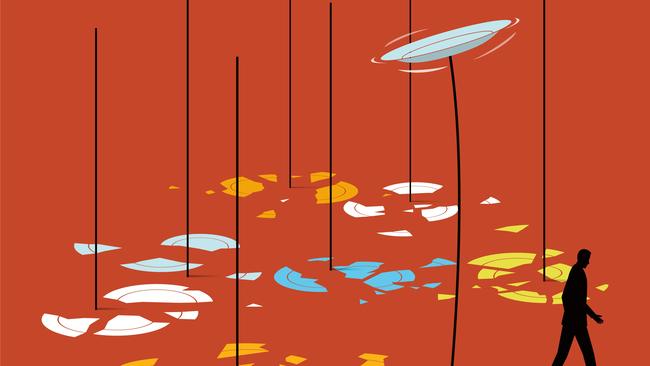
Chris Lucas’s first restaurant – One Fitzroy Street, in Melbourne’s often colourful St Kilda – wasn’t a huge success when it opened in 1996. The reviews were just OK; the location challenging. It didn’t matter; restaurants proved addictive to the former IBM tech wizard and the highs have been very high since. Botanical, Chin Chin, Kisume, Baby… the list is long. The payroll’s up to some 1400 staff. There have been awards, rewards, the visceral throb of a family of pumping restaurants making millions of dollars a week. Yet none of that prepared Lucas for the situation he and many other restaurant operators now face.
“Today,” he says, “I’ll go in to the office and we’ll do what we try to do every day – we are spending most of our time just dealing with personnel issues. We’ve got a lot of kids [staff] on the edge. We’ve got about 10 kids, I wouldn’t call it a suicide watch, but we are ringing them every three or four hours and just keeping an eye on them.”
Restaurants, and their staff, exist for the very act of throwing open the doors. Few sectors rely so heavily on people for the wheels to turn. Like other businesses in the Victorian capital, Lucas’s seven Melbourne joints – we’ll put aside his Sydney business for now – have endured six lockdowns in the past 18 months. And it’s this stop-start stuff that has delivered such a savage hit to morale.
It was early August and the most recent lockdown had just been announced when one of Lucas’s “kids” told a staff meeting they “couldn’t take it any longer”. It set alarm bells ringing and on this occasion things did escalate. Three weeks after that meeting, one of the employees didn’t answer the phone. “Luckily our HR director, who’s a terrific guy, had the wherewithal to drive to the flat,” says Lucas. “He broke the door down and there was our staff member, lying on the ground [with self-inflicted injuries].” The waiter’s parents live interstate. “We applied for a permit for the parents to come down and were rejected,” says Lucas, who has been a vocal critic of the Victorian government’s handling of the pandemic and its impact on small business, particularly the restaurant sector. “They replied, ‘Unless the employee is in imminent danger of dying within the next seven days, the request is rejected’. Can you believe that?”
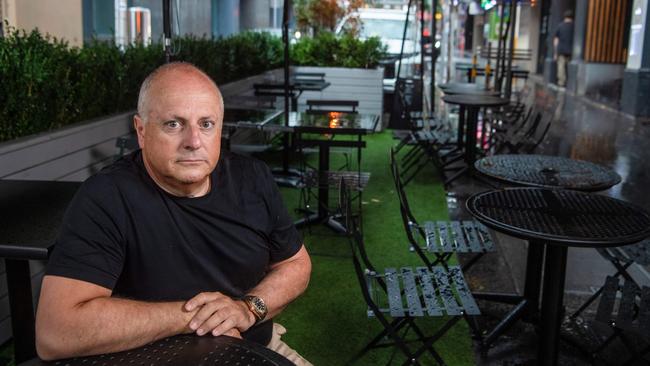
Behind the financial hit taken by so many in the industry, from dishwashers to owner-operators, is a raft of unseen issues confronted by a mostly young, often itinerant workforce made particularly vulnerable by loss of work or reduced hours. The latest figures will be of no surprise to anyone in Victoria or NSW. They show that the hospitality industry (accommodation and food services) continued to be the most affected by payroll job losses over the Covid-19 period. In NSW, it’s been estimated, about 50,000 workers in the sector have lost their jobs. Restaurant and Catering Australia’s CEO Wes Lambert estimates that across both states, more than 30 per cent of employees in restaurant and catering businesses are stood down right now. Many others are on minimal hours.
Even as a “road map” emerges for hospitality businesses to reopen, there’s still much uncertainty. “Being in isolation and then coming out and having to perform in a busy restaurant is really hard,” says another of Melbourne’s most influential restaurateurs, Andrew McConnell, who employs about 400 staff at places such as Supernormal, Cumulus Inc and Gimlet.
The extreme challenges of the stop-start-stop nature of Victoria’s lockdowns, in particular, haven’t been confined to the operators, McConnell says. “For a lot of people who’ve been in isolation and who may live alone, or in a cramped environment, to come out into a busy restaurant creates anxiety. And a lot of people in isolation are questioning what future hospitality can offer… last year we lost a lot of people who simply left the state, and I couldn’t blame them.”
Tired of uncertainty, disillusioned with an industry that used to cross over into fun and camaraderie, waiters and chefs are grabbing a bus out of the industry, most of them holding a one-way ticket. Todd Moses worked in restaurant kitchens for almost 20 years before, as he puts it, “the decision was made for me”. As head chef of the highly regarded French Saloon in Melbourne’s CBD, his career was at its zenith when his boss told him in 2020 that they wouldn’t be reopening. “And that’s the bittersweet side of it,” Moses says. “The restaurant was in the best position it had been in for the four and a half years we had been trading. Taking on the French Saloon was my time to have a real crack at it.”
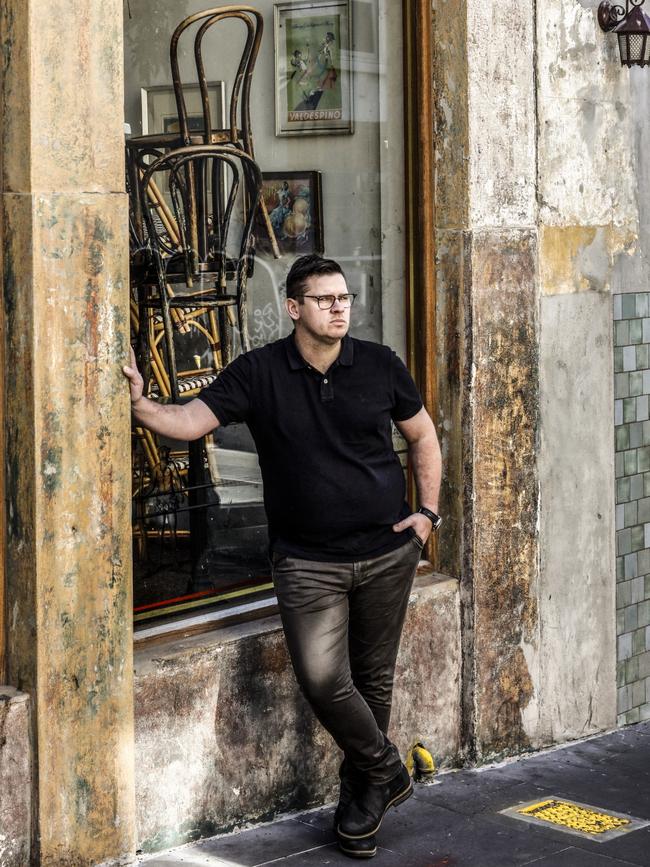
With a young family, some serious thinking about his career was needed. Running his own place was never on the radar. “I didn’t want to buy myself a job and put myself into that kind of stress. So the question was, who else could I work for and use these skills?” Moses is now a business development manager for high-end food producer Yarra Valley Caviar. “They were looking to take on someone in a sales role, and what I don’t have in sales experience I obviously have in kitchen smarts and knowledge of the product in that environment. But I can’t see myself going back into commercial kitchens.”
It’s not just successful chefs giving up on the game. “It was income, mental health, what’s next, am I going to have enough shifts next week, and then making promises to other people about their shifts I probably couldn’t keep,” says Tiffany Roberts, 28.
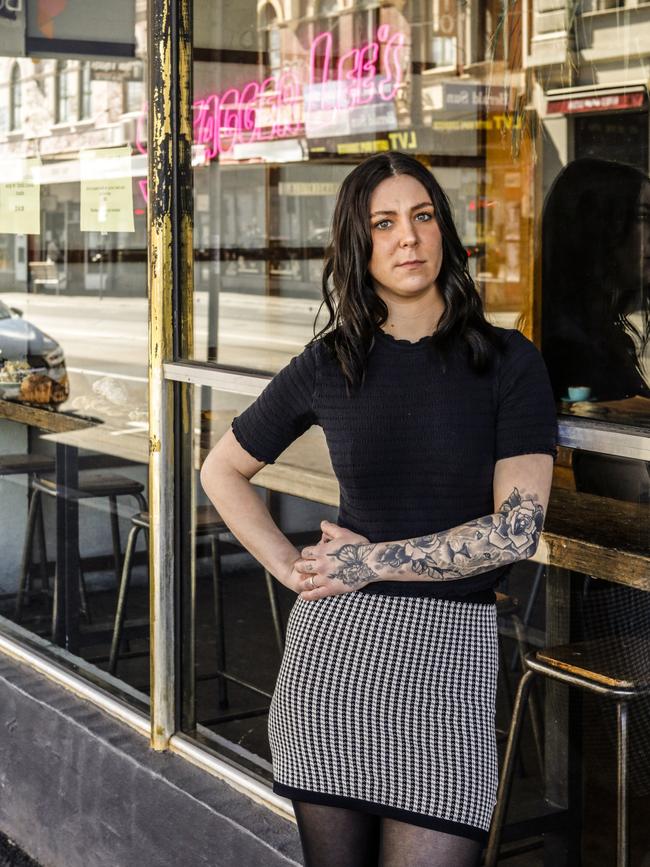
She’d worked in cafes all her adult life and had graduated into a management role at cult burger bar Stagger Lee’s in Fitzroy, a business that pivoted to takeaway. “I always wanted to work in hospitality and had a dream of owning my own place one day, being my own boss, you know…” She’s sure that dream is over. “The way it is at the moment, nobody can give you a straight answer because nobody knows. I needed a stable income.” She quit what was left of her job in July and started as a credit officer with a finance company, a role she says will blossom into a proper career.
Her partner, Engin Cosgun, helped her get the job; he’d already walked away from a business that, pre-pandemic, had four thriving foyer-style corporate cafes. “In March 2020 all of them closed, everyone was told to work at home, and none of them ever reopened,” says Cosgun, who now works for a finance company and says that despite having made hospitality his career path since school, it’s over. “Last year was bills, rent and no trade,” he says. “Big stress. There’s a different kind of pressure in hospitality, a deadline every two minutes. I’m not going back to that.”
In the resort village of Daylesford, 90 minutes from Melbourne, hotelier and restaurateur Alla Wolf-Tasker is working hard to retain a team in a regional location where staffing has always been a challenge and extensive sponsorship of internationals the norm.
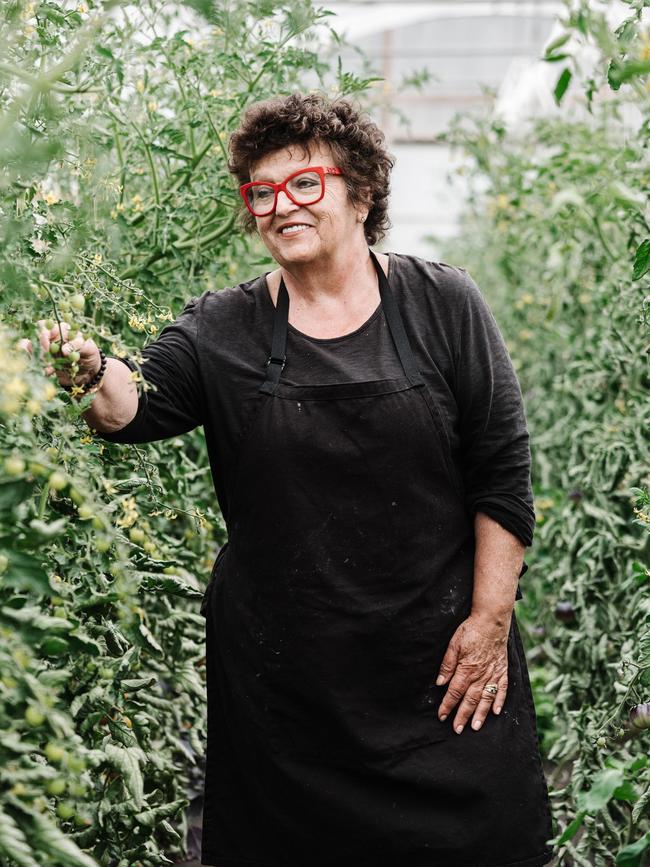
“We keep them close,” she says. “They are largely career professionals, already highly skilled and experienced, or being developed by us. If and when we open, we need to move quickly to re-establish our service protocols.
“We can’t afford to miss a beat. We need a team with a unified understanding and focus. Finding new staff is not an option and neither is temporary agency staff, which lots are having to resort to.” It means providing accommodation, and topping up the $750 per week federal government allowance with as many hours of work as the business can justify. “The vast majority have relocated from elsewhere – from the city, from interstate and from overseas. With few exceptions we continue to keep them employed. That is, on our books, no matter what. So they continue to accrue leave and time towards their visa requirements, if they’re being sponsored by us for permanent residency. It’s an expensive business but one we’re not prepared to give up yet.”
In a much smaller business, resources are thinner. Lucas says it’s the bottom 50 per cent of the industry that will suffer most because they don’t have the resources to see the lockdown through, let alone re-open.
Jesse Gerner has two restaurants and a bar in Melbourne, and about half the 80-strong staff he had two years ago. There’s no HR department, and Gerner’s wife, who was hands-on in the business, has gone back to teaching. “Basically, people are just getting depressed,” says the chef-turned-entrepreneur. “A lot of our crew come from overseas, so, no family. We’re reaching out with emails and the odd phone call, and there are friendship groups within the crew who do Zoom socials. For a lot of people in this business, their social life is a drink after work. That’s how friendship groups develop… that’s how you build a good team. So yes, we’ve lost a few who have gone back home to Spain, just cracked it. There’s no real bright light. Depression has been a real factor.”
A restaurant is not just what you see when you sitdown. It’s a matrix of individuals: waiters and cooks, obviously, but down the food chain, delivery drivers, wholesalers and growers. Fishermen, wine-growers, brewers and people who crush olives for oil. The person who washes windows for a living; the person who handles accounts. “A lot of them are small family businesses – our fish, meat and veg suppliers are all just one-man-bands,” says Lucas. “The seafood guys are finding it really hard. Each time we’ve locked down they’ve thrown out hundreds of thousands of dollars’ worth of seafood. Last year, when we were under JobKeeper, a lot of suppliers could enter into arrangements where they had money coming in. This time around, without JobKeeper, a lot of restaurants have just not paid because they can’t. There’s millions and millions of dollars out there in the restaurant world that’s owed to suppliers that’s not getting paid because the restaurants just haven’t got the money.
“We close the doors and we can’t get customers in. The knock-on effect is the suppliers don’t get paid by us. So each week we’re paying out as much money as we can from the meagre amount we’re getting through the door [from takeaways and home deliveries]. First we pay the staff, then we pay the suppliers. There’s a massive knock-on effect. It’s the smaller ones that will go.”
One of those suppliers is Melbourne seafood wholesaler Ocean Made. For anyone in perishables the lockdowns are a nightmare and Ocean Made’s owner George Lucas says stop-start is the killer. He offers the five-day snap lockdown before Valentine’s Day this year as an example. “We’d already bought all the seafood during the week… and Valentine’s was going to be over a weekend, so two days. Whaddaya do? Some went in the bin, some we gave away; you do whatever you can. Things like oysters, barramundi and salmon we order a week in advance sometimes. I don’t calculate it because I don’t want to, but one of the lockdowns would have been in excess of 50, 60 grand. And that’s just one lockdown.”
He bought three new vans, taking the total to 13, just before the latest snap lockdown in Melbourne. Right now, he’s using four. “At the end of the day, restaurants will open, restaurants will succeed, they’ll come back stronger than ever… it’s just getting there, and the mental side of it this time has been a lot harder than it was last year.”
The Sydney story is a little different. While this latest lockdown will have lasted nearly four months, there hasn’t been the same stop-start, stop-start cycle for employers to manage with staff, and for kitchens to manage with suppliers and produce. “The lockdowns here have been hard – and long – but at least we’ve had more continuity [than in Melbourne],” says Elizabeth Hewson, marketing manager at the Sydney-based Fink Group, with restaurants (including Quay) in Sydney, Byron Bay and Brisbane. “At last count, two as opposed to six. I think as a business that’s extremely gruelling and challenging to deal with – financially, sure, but particularly mentally.”
The business provides all staff with access to a psychological consultancy, PeopleSense. “It’s paid for by the company and completely anonymous; it’s always on and it’s always available,” says Fink Group general manager Jeremy Courmadias. “We’re asking all the staff to keep checking in on each other constantly. What we learnt from the first lockdown was that you really need to have clean lines of communication with the team.
“During the last lockdown there was a huge amount of uncertainty,” he adds. “Nobody really knew how long it was going to go on or what was going to happen on the other side. This time, with the vaccine rollout in play, and the knowledge that when we reopen we are going to open with a bang like we did last time, we found that a lot of the staff are calmer than they were last time. They’re actually getting on and enjoying their time out because they know this will come to an end.”
Chris Lucas has restaurants in both cities and says there are distinct differences in the way authorities deal with operators either side of the Murray. “Chalk and cheese,” he says, in characteristically pugnacious fashion. “In NSW they’ve been working with us and communicating with us on a very regular basis and they’ve also provided JobSaver, which is the equivalent of what JobKeeper used to be, so they’ve been really good to work with… we’ve got a really positive, engaging environment up there and a good relationship with the authorities.
“Down here [in Victoria] of course it’s quite the opposite. Here it’s just zero; zero communication, no dialogue, zero input, you can’t even pick up the phone and call someone here. There’s a huge vacuum. The only person trying to help is the city mayor and she’s pissing into a tornado.”
Wolf-Tasker admits to dark times, a situation exacerbated by the fact that she and her husband Allan extended themselves financially just prior to Covid with the development of a new property (The Lodge at Dairy Flat Farm), compounded by a serious illness. And yet… “My own intuitive response in stressful times has always been to feed people,” she says. “Last week there was a knock on the door and a young Sri Lankan couple – he a most promising young chef and she brilliant in our front office – arrived bearing a beautiful feast.
“We unwrapped parcel after parcel of pandan leaves filled with fried pastries, condiments and a fiery, delicious curry. They couldn’t stay, of course, but our home was filled with the most beautiful smells and that warm feeling that comes from being cared for. It was difficult not to weep.”
Lifeline 13 11 14; beyondblue.org.au

To join the conversation, please log in. Don't have an account? Register
Join the conversation, you are commenting as Logout